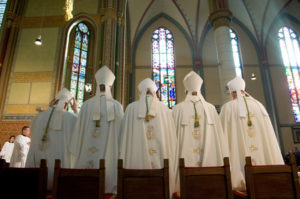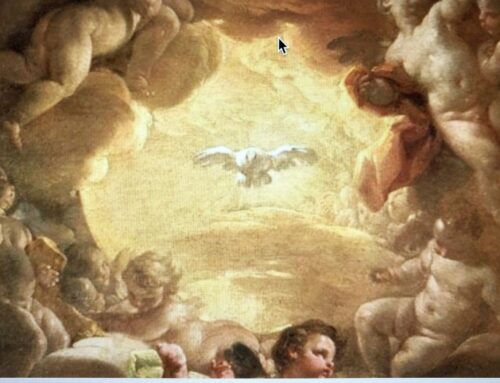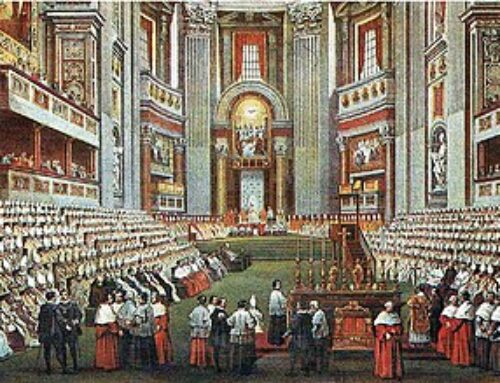 The story thus far: When Pope Francis advised young people to “cry out” on issues, I commented that though “no fair-minded person would doubt his good intentions,” his advice had serious shortcomings. My suggestion immediately drew several responses that challenged me, not for criticizing Francis, as I might have expected, but for suggesting he had good intentions! That surprised me and so I began exploring how widespread—and how fair—this dissatisfaction with Francis is. This essay continues the exploration.
The story thus far: When Pope Francis advised young people to “cry out” on issues, I commented that though “no fair-minded person would doubt his good intentions,” his advice had serious shortcomings. My suggestion immediately drew several responses that challenged me, not for criticizing Francis, as I might have expected, but for suggesting he had good intentions! That surprised me and so I began exploring how widespread—and how fair—this dissatisfaction with Francis is. This essay continues the exploration.
Two significant books about Francis’ papacy have recently been published: Philip Lawler’s, Lost Shepherd: How Pope Francis Is Misleading His Flock, and Ross Douthat’s To Change the Church: Pope Francis and the Future of Catholicism. Though the authors’ backgrounds are different—Lawler a long-time Catholic scholar and editor, Douthat a New York Times commentator and a convert to Catholicism—their assessments are remarkably similar.
Lawler describes his journey from enthusiastic to “puzzled” and then to “distressed” about Pope Francis. He explains his reasons this way: “Pope Francis has not taught heresy, but the confusion he has stirred up has destabilized the universal Church. The faithful have been led to question themselves, their beliefs, their Faith. They look to Rome for guidance and instead find only more questions, more confusion.”
Douthat summarizes his analysis of Francis’ papacy as follows: In the beginning it was one of “faith-filled outreach,” but is now one of “division—warring clerics, a balked and angry pope, a church divided by regions and nationalities, a Catholic Christianity that cannot preach confidently because it cannot decide what it believes.”
The structure, style, scope, and focus of the two analyses are quite different. Yet that said, the evidence offered in support of their judgments is not only similar but in many cases identical, so I will group it by category rather than by author. The headings are my own. Where a passage includes direct quotation of the author and/or Pope Francis, I reference PL for Lawler or RD for Douthat.
Imprudent
Pope Francis has said, “He who shuts factories and closes companies as a result of economic operation and unclear negotiations, depriving men and women from work, commits a very grave sin” (PL); has called President Trump’s idea for a wall on the southern border “not Christian” (PL); has referred to money as “the dung of the devil”; and has said that Catholics “don’t have to breed like rabbits.” (RD)
Francis appointed as Coordinator of the College of Cardinals, Honduran Cardinal Maradiaga, who had claimed sex-abuse complaints were a creation of the American media, who are controlled by Jewish interests. (PL) Francis also appointed as president of the Pontifical Academy for Life Archbishop Paglia, who (in Lawler’s words) “was responsible for a sex-education guide that featured explicit images, instructed young children in sexual techniques, and encouraged discussion of sexuality without reference to the Church’s moral teaching.” In addition, Paglia “had commissioned an enormous homoerotic mural for [his] cathedral,” with himself depicted among the frolickers. (PL)
On several occasions Francis gave interviews to journalist and atheist Eugenio Scalfari, the first when the man was 89. On all those occasions Scalfari took no notes or tape recordings but transcribed the interviews from memory. The transcripts contain these quotes from Francis: “Our species will end but the light of God will not end and at that point it will invade all souls and it will all be in everyone.” Also, that lost souls will be “annihilated” rather than damned. And concerning communion for the remarried: “The de facto appraisals are entrusted to the confessors, but at the end of faster or slower paths, all the divorced who asked will be admitted.” (RD)
Manipulative
Lawler claims that Francis manipulated the Synod of 2014-2016, notably by helping to advance German Cardinal Walter Kasper’s proposal to allow remarried Catholics to return to the sacraments. Instead of streamlining the annulment process, Kasper recommended a penitential process that “directly contradicted the teaching of John Paul II in Familiaris Consortio.
Lawler also claims that the Pope was involved in “the subversion” of the Synod’s procedures that released an interim report to the press before the Synod fathers reviewed it. (Note: A majority of the bishops in attendance disagreed with the propositions in the report, one of which was suggested in this statement: “Homosexuals have gifts and qualities to offer to the Christian community: are we capable of welcoming these people, guaranteeing to them a fraternal space in our communities?”) Moreover, though the final Synod document stated that its purpose had been to “discern how the Church and society can renew their commitment to the family founded on marriage between a man and a woman,” the Vatican’s official English translation omitted the italicized words.
Biased Against Conservatives
Pope Francis elevated to Cardinal two liberal American prelates: Blaise Cupich and Joseph Tobin, while passing over three prominent conservatives: Jose Gomez, Charles Chaput, and William Lori. (PL) He also appointed or elevated clerics who oppose the Church’s positions on abortion, contraception, masturbation, divorce, homosexuality, and the normalization of second marriages; and he has allowed such people, notably Cardinals Kasper and Baldisseri, to speak in opposition to Church teaching on such matters. (RD)
Douthat concludes that Pope Francis “always seems to have time for secular and liberal and non-Catholic opinion,” even while “the theological concerns of conservative Catholics are waved off as pharisaism.” This and the other troubling behaviors that Douthat details convince him that Francis is “driving the church not toward synthesis but toward crisis.” (Whether this is because Francis is acting intentionally or has not thought his vision through carefully or taken full measure of its consequences, Douthat is not sure.)
Intolerant of disagreement
Months after his election, Francis “became increasingly strident, even insulting, in his public utterances” against those who were perceived as unsupportive of his desired changes, describing them in such terms as “careerist bishop,” “sourpuss,” “smarmy, idolater priest,” “moralistic quibbler,” “people without light: real downers,” “starched Christian,” “bubble Christian” “parrot Christian,” “long-faced, mournful funeral [sic] Christian.” (PL)
After Francis published his exhortation Amoris Laetitia (The Joy of Love), according to Douthat, “he continued to let them [conservatives] have it verbally” on a weekly basis in various contexts. And when a group of cardinals formally asked him for clarification of numerous points they found confusing in his exhortation, he declined to answer them and the questions of the Congregation for the Doctrine of the Faith, as well. Later, he cancelled a scheduled meeting with the cardinals.
Unorthodox
Douthat states that “at the very least Francis’s admirers believe that his efforts to change the church . . . are an imitatio Christi for our times” by putting mercy and forgiveness “above the law.” But he notes that such an approach is nowhere found in church teachings and nowhere did Jesus ask his disciples to “do something that violates the Ten Commandments for the sake of a higher or more complicated or nuanced moral vision.” What this amounts to for liberal Catholicism, Douthat suggests, is that “to fulfill Jesus’s mission, to follow the Jesus of faith, even the Jesus of Scripture must be left behind.”
Confusing
The Pope is fond of saying to young people, “Shake things up, “Make noise,” “Make a mess,” or “Raise hell” about issues without being more specific. (RD)
He has said, “Avoiding pregnancy is not an absolute evil” without explaining what means of avoidance are acceptable. (PL) He has also remarked “If someone is gay and is searching for the Lord and has good will, who am I to judge him?” seeming to imply a challenge to Catholic teaching. (RD)
Another example of a confusing statement—this one reported in Crisis Magazine rather than in Lawler or Douthat—is Francis’ reference to the Greek Orthodox view of remarriage and the Eucharist. “I believe that we need to look at this [issue] within the larger context of the entire pastoral care of marriage . . . The Orthodox have a different practice. They follow the theology of what they call oikonomia, and they give a second chance, they allow it.” The statement could be viewed as a signal of support for changing Catholic teaching. But he did not clarify whether he intended such a signal.
How will Catholics regard these responsibly written, well-documented books? I suspect those who are in the habit of ignoring clerical guidance altogether will be unmoved. Those who remain loyal to the Church but are relatively uninformed about its difficulties may blame Lawler and Douthat for intruding on their contentment. Yet many others, I suspect a majority, will be very troubled by the many questions the books raise for them, among them the following:
How can Pope Francis be so humble, unassuming, and unpretentious in his dress, mode of transportation, and housing, and yet arrogant, dismissive, and divisive in his dealings with those who disagree with him, including his fellow members of the hierarchy? Put differently, why isn’t the spirit of St. Francis that he so warmly embraced more consistently manifested in his behavior?
If Francis and the liberal prelates who support him truly believe Catholic doctrine needs to be changed in matters such as contraception, divorce/remarriage, and homosexuality (inter alia)—and even more importantly, if they trust that the Holy Spirit is guiding them in that mission—why aren’t they advancing their arguments directly, openly and forthrightly rather than hinting, implying, and vaguely suggesting them? And why are they not putting aside their intolerance and manipulation of those who sincerely believe the Holy Spirit is on their side?
Why do conservative prelates vigorously proclaim the indissolubility of marriage and yet say little or nothing about the new “fast-track” annulments that strain the concept of “impediment” beyond all reason? (Note: In one study, the U.S., had less than 6% of the world’s Catholics, yet 60% of the world’s annulments, over 99 % of them granted for defect of consent. This after a couple of millennia during which even illiterate peasants were assumed to have given valid consent to their marriages.)
Why do conservative prelates demand that traditional Catholic teaching on divorce and remarriage be strictly enforced, and yet say little or nothing similar about contraception? Why are there few, if any, warnings from the pulpit about Catholics receiving the Eucharist while using “artificial birth control”? Certainly not because Church teaching on contraception is widely supported—a 2016 Pew Research poll revealed that 89% of Catholics say that contraception is morally acceptable or not a moral issue at all.)
As the drama of Pope Francis’ pontificate continues to unfold, the best way to survive the intellectual and spiritual turmoil with our faith intact is to remind ourselves frequently that the Holy Spirit ceaselessly imparts truth and wisdom but never forces their acceptance, so any confusion and division in the Church is due to human fault or weakness. Accordingly, when we feel disappointed by the Church, we should focus that feeling on the flawed human beings responsible but never on God.
Copyright © 2018 by Vincent Ryan Ruggiero. All rights reserved


